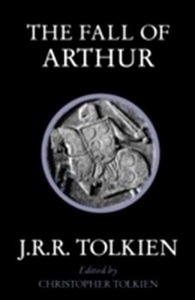The Fall of Arthur

Editorial Harper Collins
Fecha de edición mayo 2015 · Edición nº 1
Idioma inglés
EAN 9780007557301
Libro
encuadernado en tapa blanda
Resumen del libro
The world first publication of a previously unknown work by J.R.R. Tolkien, which tells the extraordinary story of the final days of England's legendary hero, King Arthur. The Fall of Arthur, the only venture by J.R.R.
Tolkien into the legends of Arthur King of Britain, may well be regarded as his finest and most skilful achievement in the use of the Old English alliterative metre, in which he brought to his transforming perceptions of the old narratives a pervasive sense of the grave and fateful nature of all that is told: of Arthur's expedition overseas into distant heathen lands, of Guinevere's flight from Camelot, of the great sea-battle on Arthur's return to Britain, in the portrait of the traitor Mordred, in the tormented doubts of Lancelot in his French castle. Unhappily, The Fall of Arthur was one of several long narrative poems that he abandoned in that period. In this case he evidently began it in the earlier nineteen-thirties, and it was sufficiently advanced for him to send it to a very perceptive friend who read it with great enthusiasm at the end of 1934 and urgently pressed him 'You simply must finish it!'But in vain: he abandoned it, at some date unknown, though there is some evidence that it may have been in 1937, the year of the publication of The Hobbit and the first stirrings of The Lord of the Rings.
Years later, in a letter of 1955, he said that 'he hoped to finish a long poem on The Fall of Arthur'; but that day never came. Associated with the text of the poem, however, are many manuscript pages: a great quantity of drafting and experimentation in verse, in which the strange evolution of the poem's structure is revealed, together with narrative synopses and very significant if tantalising notes. In these latter can be discerned clear if mysterious associations of the Arthurian conclusion with The Silmarillion, and the bitter ending of the love of Lancelot and Guinevere, which was never written.
Biografía del autor
John Ronald Reuel Tolkien nació el 3 de enero en Bloemfontein en el Estado Libre de Orange. A principios de 1895, su madre, agotada por el clima, regresó a Inglaterra con Ronald y su hermano pequeño, Hilary. Tras el fallecimiento de su padre, a causa de unas fiebres reumáticas, él y su familia se establecieron brevemente en Sarehole, cerca de Birmingham. Esta hermosa zona rural causó una honda impresión en el joven Ronald, y sus efectos pueden verse en su escritura y en algunos de sus cuadros. Mabel falleció en 1904, y los hijos quedaron a cargo del padre Francis Morgan, un sacerdote del Oratorio de Birmingham. En el King Edwardx{0026} x02019;s School, Ronald desarrolló su amor por las lenguas; más adelante inventaría sus propios idiomas. También por esta época conoció a Edith Bratt, con quien se casó en 1916. Cuando estalló la primera guerra mundial en 1914, Ronald era todavía un estudiante en Oxford. Se graduó al año siguiente, con un sobresaliente en Inglés y poco después fue enrolado como teniente en los Lancashire Fusiliers. En 1916 combatió en la batalla del Somme, pero cayó víctima de la fiebre de las trincheras y fue devuelto a casa como no apto para el servicio. Tolkien fue uno de los mejores filólogos de su época y gran parte de su vida laboral transcurrió en Oxford, primero como profesor de anglosajón y luego como profesor de lengua inglesa y literatura. Al mismo tiempo, en privado, trabajaba en el gran ciclo de mitos y leyendas que más adelante se publicaría con el título de El Silmarillion. Edith y él tuvieron cuatro hijos, y en parte fue para ellos por lo que escribió el cuento El Hobbit, publicado por Allen x{0026}amp; Unwin en 1937. Tuvo tanto éxito que el editor quiso tener en seguida una secuela, pero no fue hasta 1954 que apareció el primer volumen de la obra maestra de Tolkien, El Señor de los Anillos, con un éxito inmediato. Su enorme popularidad sorprendió a Tolkien. Ronald y Edith Tolkien se mudaron a Bournemouth al llegar a la vejez, pero cuando Edith murió en 1971, Tolkien regresó a Oxford. Ronald Tolkien falleció el 2 de septiembre de 1973, tras una breve enfermedad.








